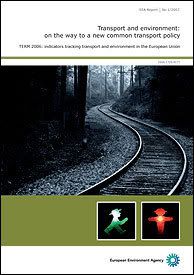Transport crucial to meeting Kyoto targets, but EU policies failing - report
 In the context of the Kyoto Protocol, the EU has committed to reducing greenhouse-gas emissions by 8%, compared with 1990 levels, before 2012.
In the context of the Kyoto Protocol, the EU has committed to reducing greenhouse-gas emissions by 8%, compared with 1990 levels, before 2012. Transport is responsible for around one fifth of all GHG emissions in the EU.
In 2001, the EU set out a ten-year strategy to make its transport sector more sustainable, mainly by breaking the link between growth in transport and economic growth and by shifting towards more sustainable transport modes (intermodality), such as railways, water transport and public transport.
But according to a new report from the European Environment Agency, this strategy is not yielding strong results. The Commission's mid-term review of the White Paper, adopted in June 2006, makes no reference to curbing overall transport growth, instead advocating the "decoupling of transport growth from its negative effects". Recent proposals aimed at introducing cleaner fuels such as biofuels and imposing caps on CO2 emissions from cars and airplanes also appear to go in this direction.
The EEA report, "Transport and Environment: on the way to a new common transport policy" [*.pdf], says that despite the new measures, European transport policy must deal more strongly with spiralling demand for transport. Between 1990 and 2003, passenger transport volumes in the EEA countries grew by 20%. Air transport grew the most, 96%, during this period:
 biomass :: bioenergy :: biofuels :: energy :: sustainability :: climate change :: greenhouse gas emissions :: transport :: Kyoto :: EU ::
biomass :: bioenergy :: biofuels :: energy :: sustainability :: climate change :: greenhouse gas emissions :: transport :: Kyoto :: EU :: While emissions from most other sectors (energy supply, industry, agriculture, waste management) dropped between 1990 and 2004, emissions from transport increased substantially driven by this increase in demand.
Transport is responsible for 21 % of total greenhouse gas (GHG) emissions in the EU-15 (excluding international aviation and maritime transport). Road transport contributes 93 % of the total of all transport emissions. However, emissions from international aviation are growing fastest with an increase of 86 % between 1990 and 2004.
GHG emissions (excluding marine and aviation) from transport grew the most in Luxembourg and Ireland between 1990 and 2004 with respective increases of 156 and 140 %. The average increase in the 32 EEA member countries was 25 %.
“By suggesting that we simply deal with the environmental impacts of transport, the mid term review of the 2001 White Paper on Transport could be interpreted as a softening of Europe’s line on the need to deal with transport volumes. This cannot be the case,” said Professor Jacqueline McGlade, Executive Director of the EEA.
“We cannot deal with the increasing GHG emissions, noise pollution and landscape fragmentation caused by transport without dealing with the increasing traffic across the spectrum: on our roads and railways, in the air and by sea. Technical advances, such as cleaner, more fuel efficient engines are very important but we cannot innovate our way out of the emissions problem from transport.” she said.
The report also highlights the significant role that transport subsidies play in terms of directing transport choices. Between €270 and €290 billion is spent annually in Europe in transport subsidies. Almost half of these subsidies go to road transport, one of the least environmentally friendly modes. The EEA will release a detailed study of transport subsidies in March 2007
Pollution from transport is also having a direct effect on our health. Almost 25% of the EU-25 population live less than 500 meters from a road carrying more than three million vehicles per year. Consequently, almost four million life-years are lost each year due to high pollution levels, the report says.
More information:
EEA: Transport and environment: on the way to a new common transport policy [*.pdf, 5071 KB]
EurActiv: Report: 'EU transport policies failing on climate' - Feb. 26, 2007
 ------------------------
------------------------
 Spanish company Ferry Group is to invest €42/US$55.2 million in a project for the production of biomass fuel pellets in Bulgaria.
The 3-year project consists of establishing plantations of paulownia trees near the city of Tran. Paulownia is a fast-growing tree used for the commercial production of fuel pellets.
Spanish company Ferry Group is to invest €42/US$55.2 million in a project for the production of biomass fuel pellets in Bulgaria.
The 3-year project consists of establishing plantations of paulownia trees near the city of Tran. Paulownia is a fast-growing tree used for the commercial production of fuel pellets.









0 Comments:
Post a Comment
Links to this post:
Create a Link
<< Home